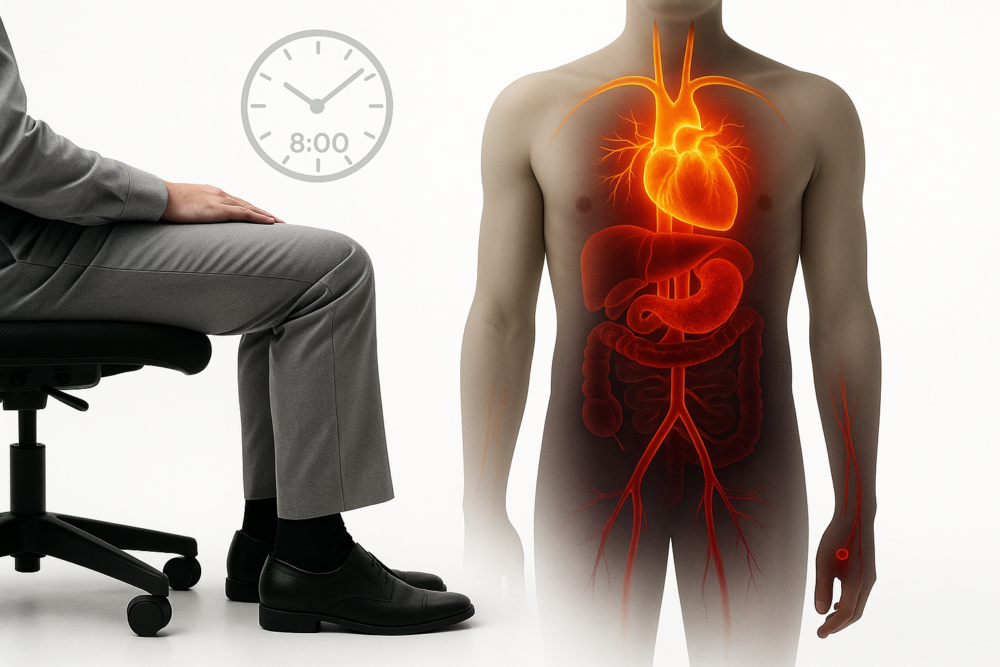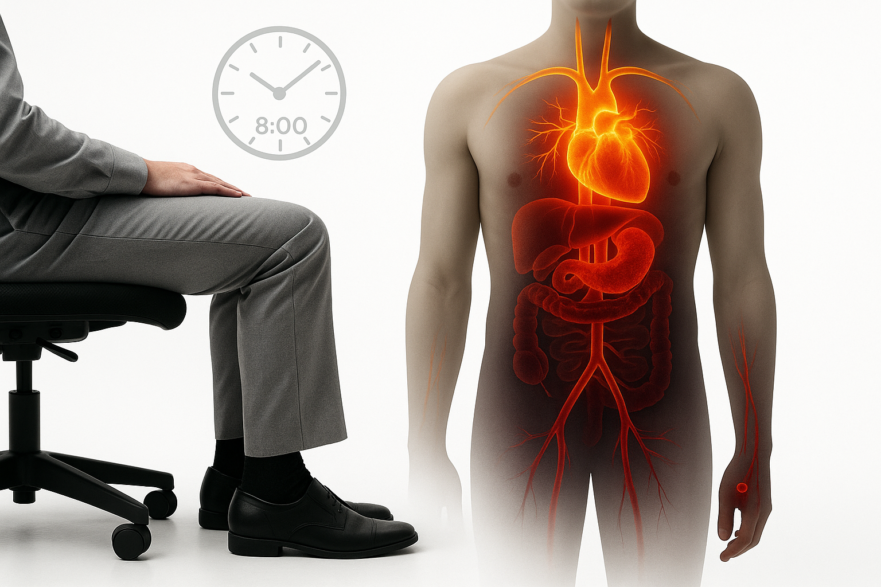
Have you ever stopped to think about your heart? I mean really think about it. This incredible muscle beats over 100,000 times a day, pumping life-giving blood to every single cell in your body, all without you ever having to ask. Yet, for most of us, we only pay attention to it when something goes wrong. And unfortunately, when it comes to heart disease, the first sign is often the last—a sudden heart attack or stroke. Heart disease is the number one killer worldwide, and its prevalence is rising at an alarming rate. The World Health Organization reports that deaths from ischaemic heart disease alone skyrocketed from 2.7 million in 2000 to over 9 million by 2021. The scariest part? It’s often a silent disease, building up over years, caused by seemingly harmless daily habits.
You might think you’re living a relatively healthy life, but there could be hidden dangers in your routine that are putting immense strain on your most vital organ. In this article, we’re going to pull back the curtain on four of the most common—and most destructive—habits that lead to heart failure. My goal is to empower you with the knowledge to spot these risks in your own life and give you simple, actionable steps to protect your heart for the long haul. It’s time to stop guessing about your health and start taking control.
Key Takeaways
- Rethink Your Drink: Excessive alcohol, even if it’s only on weekends, can cause serious heart damage, including abnormal rhythms and high blood pressure. The safest amount of alcohol for your heart is none.
- Beware of Hidden Salt: A high-sodium diet is a primary driver of high blood pressure. Salt isn’t just in the shaker; it’s hiding in massive amounts in processed foods, from bread and cereals to sauces and canned goods.
- Prioritize Quality Sleep: Consistently sleeping less than 7-9 hours a night prevents your heart from resting, elevates stress hormones, and increases your risk for high blood pressure, high cholesterol, and insulin resistance.
- Sitting is a Serious Threat: Living a sedentary lifestyle, characterized by long hours of sitting, is an independent risk factor for heart disease, even if you exercise regularly. It reduces blood flow and promotes the buildup of dangerous plaque in your arteries.
1. You’re Drinking Too Much (Even if It’s Just on Weekends)
Many people live by the mantra of “work hard, play hard.” They eat clean, exercise, and avoid alcohol all week, only to indulge in heavy drinking over the weekend. If this sounds like you, I have some bad news. Your heart doesn’t average out your behavior. According to Dr. Dmitry Yaranov, a heart transplant cardiologist, this pattern is incredibly dangerous. “This one day of heavy alcohol use, it’s not going to go unnoticed,” he warns. Binge drinking, which is defined as consuming four or more drinks for women or five or more for men in about two hours, sends a shockwave through your cardiovascular system. It can trigger abnormal heart rhythms like atrial fibrillation, cause a sharp spike in blood pressure, and, over time, lead to a condition called dilated cardiomyopathy, where the heart muscle becomes weakened and enlarged, struggling to pump blood effectively.
The truth is, when it comes to your heart, there is no truly “safe” amount of alcohol. While health organizations have long suggested moderate limits—no more than one drink a day for women and two for men—the World Heart Federation has made it clear that even this level of consumption can increase your risk for cardiovascular disease. A standard drink is equivalent to 12 ounces of 5% beer, 5 ounces of 12% wine, or 1.5 ounces of 80-proof spirits. If you choose to drink, staying well below the binge-drinking threshold is critical. But the best choice you can make for your heart is to significantly reduce your intake or eliminate it altogether. Your heart doesn’t care if it’s a Tuesday or a Saturday; the damage is the same.
2. You’re on a High-Sodium Diet (And You Don’t Even Know It)
When you think of high blood pressure, you probably picture someone shaking salt all over their food. But the salt shaker on your table is just the tip of the iceberg. The vast majority of sodium in the modern diet comes from processed and pre-packaged foods, and it’s hiding in places you’d never expect. That “healthy” canned soup, the whole wheat bread for your sandwich, your morning cereal, and even the sauces and dressings you use are often loaded with sodium. Why is this so dangerous? When you consume excess sodium, your body retains extra water to dilute it. This increases the total volume of blood inside your blood vessels. Think of it like turning up the pressure in a garden hose—over time, that constant high pressure damages and stiffens the delicate walls of your arteries, making them ripe for plaque buildup. This is why high blood pressure is called the “silent killer”; you can’t feel it, but it’s relentlessly damaging your cardiovascular system.
The Dietary Guidelines for Americans recommend that adults consume less than 2,300 milligrams of sodium per day—that’s roughly one single teaspoon of table salt. For individuals with or at risk for high blood pressure, the ideal limit is even lower, around 1,500 mg. As researcher Dr. Elsie Kodjoe stated, “Adhering to sodium guidelines is one of the easier strategies individuals could readily adopt to reduce” the immense burden of cardiovascular disease. To do this, you have to become a detective. Start reading nutrition labels and you’ll be shocked. Your best defense is to cook meals from scratch using fresh ingredients. This puts you in complete control. Instead of salt, flavor your food with a world of herbs, spices, garlic, and citrus. If you buy canned goods like beans or vegetables, rinse them thoroughly under water to wash away a significant portion of the sodium. Making these simple swaps from processed to fresh is one of the most powerful things you can do for your blood pressure and your heart.
3. You’re Not Getting Enough Quality Sleep
In our hustle culture, sleep is often the first thing to be sacrificed. We treat it as a luxury rather than a biological necessity. But skimping on sleep is like forcing your heart to run a marathon every single night. The American Heart Association now includes sleep duration as one of the essential components of optimal cardiovascular health, recommending that adults get 7 to 9 hours of quality sleep per night. During healthy sleep, your body enters a restorative state. Your heart rate slows down, and your blood pressure drops by about 10-20%, giving your entire cardiovascular system a much-needed break. When you consistently get less than seven hours of sleep, you rob your heart of this vital downtime.
Chronic sleep deprivation keeps your body in a state of high alert. It leads to elevated levels of stress hormones like cortisol, which can, as Dr. Elizabeth Klodas explains, “reduce our tissues’ sensitivity to insulin, leading to higher blood sugar levels and higher cholesterol numbers.” This hormonal chaos also contributes to systemic inflammation and uncontrolled hypertension—all major pathways to heart disease. It’s not just about the quantity of sleep, but the quality. To improve your sleep hygiene, establish a consistent sleep-wake schedule, even on weekends. Create a sanctuary in your bedroom: make it dark, cool, and quiet. Avoid caffeine and alcohol in the evening, and turn off all screens at least an hour before bed, as the blue light can interfere with your body’s production of melatonin, the sleep hormone. Protecting your sleep is not a passive activity; it’s an active and crucial part of protecting your heart.
4. You’re Living a Sedentary Lifestyle
You might go to the gym for 45 minutes a day and think you’re in the clear. But what are you doing for the other 23 hours? The phrase “sitting is the new smoking” has gained traction for a good reason. A large body of research now shows that a sedentary lifestyle is an independent and powerful risk factor for heart disease. A landmark 2022 international study involving over 100,000 people made a startling discovery: individuals who sat for six to eight hours a day had a 12-13% increased risk of early death and heart disease. For those who sat for more than eight hours a day, that risk jumped to a staggering 20%. The problem is that prolonged sitting, even if you have a regular exercise routine, has its own unique negative effects.
When you sit for long periods, blood flow to your legs slows down, which can promote the formation of clots. Your body’s ability to manage blood sugar and cholesterol becomes impaired, and your blood pressure can rise. As Dr. Nicholas Ruthmann of the Cleveland Clinic puts it, the heart “is a muscle like any other muscle; if you don’t work it, it will get weak.” The solution is twofold. First, aim for at least 150 minutes of moderate-intensity exercise per week, like brisk walking, swimming, cycling, or dancing. But just as importantly, you must break up your periods of sitting. The human body was designed to move. Set a timer to get up and walk around for a few minutes every half hour. Pace around while you’re on the phone. Take the stairs instead of the elevator. Park farther away from the store entrance. Do a few squats or lunges by your desk. Every single movement counts. It’s about creating a lifestyle of activity, not just a window of exercise.
Conclusion
Your heart works tirelessly for you, day in and day out. The least you can do is protect it from the hidden habits that cause it harm. As we’ve seen, excessive alcohol, hidden sodium, poor sleep, and a sedentary lifestyle are four of the biggest culprits behind the global epidemic of heart disease. The good news is that you have the power to change them. It doesn’t require a complete life overhaul overnight. It starts with awareness and small, consistent choices.
Choose water over that second glass of wine. Read one food label today. Go to bed 15 minutes earlier tonight. Stand up and stretch right now. Each positive choice is a deposit into your health account, building a stronger, more resilient heart for the future. It’s not about achieving perfection; it’s about making progress. Start today, and your heart will thank you for decades to come.
Sources
- World Health Organization. (2024, March 11). The top 10 causes of death. Retrieved from https://www.who.int/news-room/fact-sheets/detail/the-top-10-causes-of-death
- Centers for Disease Control and Prevention. (2022, April 18). Excessive Alcohol Use and Risks to Men’s Health. Retrieved from https://www.cdc.gov/alcohol/fact-sheets/mens-health.htm
- World Heart Federation. (2023). The Impact of Alcohol Consumption on Cardiovascular Health: Myths and Measures. Retrieved from https://world-heart-federation.org/wp-content/uploads/WHF-Policy-Brief-Alcohol.pdf
- American College of Cardiology. (2023, March 6). Following a Low-Sodium Diet May Reduce Heart Failure Complications. Retrieved from https://www.acc.org/About-ACC/Press-Releases/2023/03/06/18/20/Following-a-Low-Sodium-Diet-May-Reduce-Heart-Failure-Complications
- U.S. Department of Agriculture and U.S. Department of Health and Human Services. Dietary Guidelines for Americans, 2020-2025. 9th Edition. December 2020. Available at DietaryGuidelines.gov.
- American Heart Association. (2022, June 29). Sleep is essential for cardiovascular health. Retrieved from https://www.heart.org/en/news/2022/06/29/sleep-is-essential-for-cardiovascular-health
- Garcia, J. M., et al. (2023). Device-measured physical activity, sedentary behaviour, and cardiometabolic health: a compositional data analysis in the UK Biobank. European Heart Journal, 44(33), 3167–3178. https://doi.org/10.1093/eurheartj/ehad344
- Cleveland Clinic. (2023, October 17). How a Sedentary Lifestyle Can Affect Your Heart Health. Retrieved from https://health.clevelandclinic.org/how-a-sedentary-lifestyle-affects-heart-health

